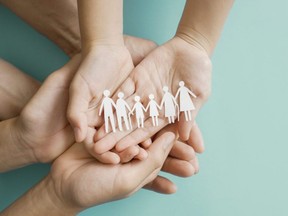
Reviews and recommendations are unbiased and products are independently selected. Postmedia may earn an affiliate commission from purchases made through links on this page.
How does one choose being a good parent? Or a good child?
It’s a dilemma facing anyone in the sandwich generation – those caring for aging parents or parent, while raising a family as well.
From our newsroom to your inbox at noon, the latest headlines, stories, opinion and photos from the Toronto Sun.
Thanks for signing up!
A welcome email is on its way. If you don't see it, please check your junk folder.
The next issue of Your Midday Sun will soon be in your inbox.
Since the pandemic, there’s more pressure on these caregivers than ever before. People are being stretched to the limit. The pandemic didn’t help – many caregivers said the pandemic made it hard to handle the work, not to mention concerns about the impact of COVID-19 on their aging parent/in-law and children, along with financial struggles and mental health issues.
Recent research shows today’s sandwich generation – those between the ages of 45 and 64, who provide 75% of the informal care for older adults as reported in a recent BMO study – are facing increased pressure: 62% of these caregivers face the stress of having to choose between being a good parent or being a good son or daughter.
According to Statistics Canada, one in four Canadians provide care to someone else. With the national dependency ratio (the number of dependents aged zero to 14 and over the age of 65) hitting a 20-year high in 2021, caregivers are facing mounting pressures to multi-task at a rate never known before.
RECOMMENDED VIDEO
These pressures can be devastating. “I had to toilet my father recently,” said 55-year-old Marie, a working mom and mother of two teens, who asked that her name not be used to protect her parent. “It was messy and embarrassing, for both of us. It broke my heart seeing such a big, strong man … reduced to having his daughter clean him up. It just ripped at my heart.”
Marie is not alone, and she admits looking for help “is so difficult.” According to a recent survey from Home Instead, Inc., (home care specialists) the majority of those in the “panini generation don’t know where to turn to or how to ask for help when it comes to relief from their caregiving duties,” noted a recent media release.
Women take the brunt of the responsibilities. A Chartwell.com blog reports from Stats Can that “family caregivers are more likely to be women who are employed and married.” As well, female caregivers “expend more energy at home than men and almost the same amount of energy at work, and typically devote a lot more energy to the parent and home maintenance roles,” as reported in a recent Carleton University study.
This pressure will only get worse in the years to come, reports the Alzheimer Society of Canada, which forecasts that around 1.7 million Canadians will be living with dementia by 2050 – with a projected nearly 1.4 billion hours of service provided by caregiving partners annually, if current trends continue.
More often than not, the caregiver puts their own health concerns aside to deal with the burgeoning family responsibilities, making them susceptible to health problems.
This delicate balancing act faced by sandwich generation caregivers is not new – in the past there would be not one but sometimes up to three generations under one roof, and stay-at-home wives and mothers carried the bulk of the workload. Today, according to Stats Canada, “the majority of working-age, non-senior women work, and are not full-time homemakers.”
-

We’re living with a food crisis – so why do we keep dumping food out?
-

Stretching food dollar with supermarket deals and meal ideas
-

Night owls could be at higher risk for type 2 diabetes and heart disease: Study
“Caring for an aging parent offers many rewarding and meaningful moments, though it does not come without its challenges,” said Debbie Franchuk, a registered nurse and co-owner and director of Care at the Home Instead, (Calgary offices), in a recent release. “For those sandwiched between generations who are raising children, while also caring for an elder loved one and juggling work, this increased responsibility can be incredibly stressful and overwhelming.”
A recent survey from Home Instead, Inc., (homeinstead.com) states the majority of those in the panini generation “don’t know where to turn or how to ask for help when it comes to relief from their caregiving duties.” Yet, “it’s important for family caregivers to voice their needs, and it’s equally important for loved ones, employers, and others in their circles to offer support,” said Franchuk.
Help is out there – it’s just a matter of finding the proper avenues. Caregivers are encouraged to do the following:
The Home Instead survey reveals the impact these pressures are having on family caregivers:
— HomeInstead.ca/SandwichGen.


